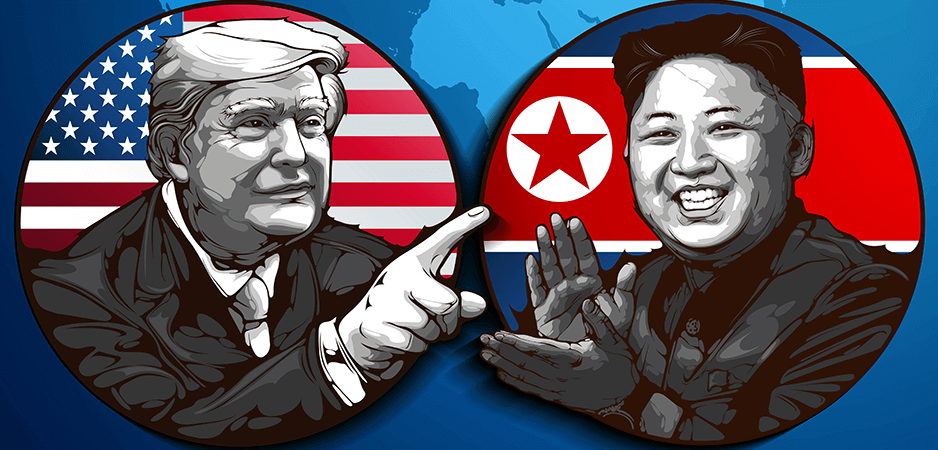Has Trump finally gone back to school? Is learning an item on his agenda?
Has Donald Trump suddenly begun to learn and adapt rather than posture and repeat? Concerning the imminent talks with North Korea, we discover, perhaps for the first time, that he is willing to change, though he of course denies it is a change. “I never said that it will happen in one meeting. I think it’s going to be a process. But the relationship is building and it is a very positive thing.”
Here is today’s 3D definition:
Relationship:
In the US, an arrangement to do business and grant reciprocal favors so long as the terms of the contract are respected. In Asia, the act of belonging to a pluralistic network of trust, unlimited by legal terms or time factors. In the rest of the world, something similar to the Asian network but also admitting of individual arrangements.
Contextual note
Significantly, The Guardian tells us that “Trump’s national security adviser, John Bolton, and Mike Pence, the vice-president — both hawks on North Korea — did not take part in the meeting and were nowhere to be seen before and after.”
Trump and his closest advisers share a worldview in which they see every arrangement as adversarial. That Trump is now talking about relationships suggests that someone who actually knows something about Asian culture may have captured his attention for five minutes, eventually dictating the message to put forward before he tries to bully his way through the negotiations.
Historical note
A year ago, General James Mattis — a moderate compared with Bolton and Pence — evoked the possibility of war with North Korea: “It would be a war that fundamentally we don’t want… but we would win at great cost.” Today the tone has changed. Diplomacy has replaced the threat of war and the promise of domination by the powerful US military, a threat Trump was still making less than two weeks ago. Now Mattis tells us, “We must maintain a strong collaborative defensive stance so we enable our diplomats to negotiate from a strong position of strength in this critical time.” This from the man who foresaw a “war more serious in terms of human suffering than anything we’ve seen since 1953,” featuring a massive attack on Seoul, with its population of 25 million.
The US has now backed off its ultimatum requiring North Korea to immediately dismantle its nuclear capacity. Instead, Trump now anticipates a “drawn-out negotiation” in what he describes as a process rather than a simple signature on a hastily established zero sum contract. “We’re over that, totally over that, and now we’re going to deal and we’re going to really start a process… I think it’s probably going to be a very successful — ultimately, a successful process,” the president said.
Trump’s language is always interesting. “We’re over that” usually suggests “we have reformed” or “we’ve been cured of something shameful.” Adding “totally” makes it sound like a radical cure. But his meaning becomes a little clearer when he follows up with, “now we’re going to deal.”
“Deal” is always a key word for Trump. In this context, “we’re over that” may mean that, in his mind, it was a planned or predictable stage in a standard negotiation ritual. Trump the master negotiator will always start with a gambit in which he pushes an extreme position to frighten the other party into reducing their hopes and ceding ground. That’s how the “art of the deal” works in Trump’s mind. Relationship building is not part of it, especially when you know you have the clout that the other party cannot theoretically oppose.
In the end, Trump predicts “it’s probably going to be a very successful” before switching to “ultimately, a successful process.” He’s caught between promising success now — one of his recurring professional tics (“we’re going to win so much you may even get tired of winning”) — and geopolitical reality, which he still doesn’t understand. But now he realizes he has no choice but to acknowledge it as something that may reduce his capacity to “win” and may also take time.
The media have documented Trump’s curious belief that by making peremptory decisions and simply proclaiming “may my will be done” that all will fall into line. He has already applied this method to the 2015 Paris agreement, the Iran nuclear deal and now tariffs on steel and aluminum. When dealing with the eternally confused and endemically ineffective members of the American political establishment — Republican and Democrat — he has managed to play his game, keeping political friends and enemies off balance.
With his declared external enemies — North Korea and Iran — so long as it was only about bluster, he has also managed to keep his act going. But when it comes to sitting down to talk with enemies his method fails. And when he makes enemies of all his allies — as he has done with his trade war — he can’t even count on “process.” He’s left with a choice between humiliation and disaster.
The real question no one can answer is this: Can Trump manage humiliation? Can he even envision it?
*[In the age of Oscar Wilde and Mark Twain, another American wit, the journalist Ambrose Bierce, produced a series of satirical definitions of commonly used terms, throwing light on their hidden meanings in real discourse. Bierce eventually collected and published them as a book, The Devil’s Dictionary, in 1911. We have shamelessly appropriated his title in the interest of continuing his wholesome pedagogical effort to enlighten generations of readers of the news.]
The views expressed in this article are the author’s own and do not necessarily reflect Fair Observer’s editorial policy.
Photo Credit: Kirkchai Benjarusameeros / Shutterstock.com
Support Fair Observer
We rely on your support for our independence, diversity and quality.
For more than 10 years, Fair Observer has been free, fair and independent. No billionaire owns us, no advertisers control us. We are a reader-supported nonprofit. Unlike many other publications, we keep our content free for readers regardless of where they live or whether they can afford to pay. We have no paywalls and no ads.
In the post-truth era of fake news, echo chambers and filter bubbles, we publish a plurality of perspectives from around the world. Anyone can publish with us, but everyone goes through a rigorous editorial process. So, you get fact-checked, well-reasoned content instead of noise.
We publish 2,500+ voices from 90+ countries. We also conduct education and training programs
on subjects ranging from digital media and journalism to writing and critical thinking. This
doesn’t come cheap. Servers, editors, trainers and web developers cost
money.
Please consider supporting us on a regular basis as a recurring donor or a
sustaining member.
Will you support FO’s journalism?
We rely on your support for our independence, diversity and quality.






